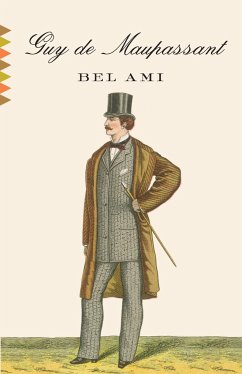"Bel Ami, "written at the height of Guy de Maupassant's powers, is a classic novel of seduction, intrigue, and ruthless social climbing in belle epoque Paris. Georges Duroy is a down-and-out journalist from a humble background who engineers a stunning rise to the top of Parisian society through his relationships with influential and wealthy women. Making the most of his charm and good looks (his admirers nickname him "Bel Ami"), Duroy exploits the weaknesses of others to his own advantage--in the process betraying the woman who has most selflessly supported him. Published in 1885, "Bel Ami "is not only a vivid portrait of a glamorously corrupt and long-vanished Paris, but also a strikingly modern expose of the destructiveness of unconstrained ambition, sex, and power. Translated from the French by Ernest Boyd
Hinweis: Dieser Artikel kann nur an eine deutsche Lieferadresse ausgeliefert werden.
Hinweis: Dieser Artikel kann nur an eine deutsche Lieferadresse ausgeliefert werden.







